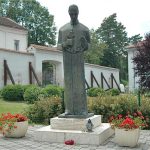Serbian Foreign Minister claims that Cardinal Alojzije Stepinac was a war criminal.
Serbian Foreign Minister Ivica Dačić said on Thursday that it was deplorable that a monument to Croatian Cardinal Alojzije Stepinac was unveiled in Osijek, calling him a war criminal and describing the monument as a clear message to the Serbs that the crimes against them are allowed and will not be punished, reports Index.hr on February 10, 2017.
“It is sad what is happening in Croatia, which is confirmed by the fact that, on the occasion of the unveiling of the monument to Stepinac, a war criminal from the time of the fascist Independent State of Croatia, the sharpest criticism came because it is located near a parking lot”, said Dačić in a statement released by the Foreign Ministry of Serbia.
Dačić, who is also the Serbian Deputy Prime Minister, asked “why is the European Union silent when it comes to the rehabilitation of fascism and war crimes”. He said that the monument to Stepinac in Osijek was “an indication that in Croatia an atmosphere has been created that an anti-Serb policy, justifying crimes committed against Serbs and rehabilitation of the fascist Independent State of Croatia, is something completely usual”.
“This sends a clear message to Serbs that crimes against them are allowed and will not be punished”, said Dačić, asking why the EU authorities in Brussels did not respond. “Why is the European Union silent about the rehabilitation of fascism and war crimes? Does silence mean approval? Or will someone from the European Union finally prove me wrong”, said Dačić.
The monument to Stepinac in Osijek was unveiled on Thursday, on the eve of the 57th anniversary of his death. During the unveiling ceremony, a controversy broke out about whether the monument was placed at an appropriate location, given that it is near a parking lot. Mayor of Osijek Ivan Vrkić told reporters that the monument was located in accordance with the opinion of the experts, in the middle of the street that bears his name.
Alojzije Stepinac was the Archbishop of Zagreb from 1937 to 1960. While the Serbian authorities claim that during the Second World War he cooperated with the Ustasha regime in the Independent State of Croatia, the majority of Croats consider him to be a saint who helped those who were persecuted at the time. After the Second World War, Stepinac was imprisoned by the ruling communist regime. Pope Francis has established a special commission of Croatian Catholic and Serbian Orthodox officials who are investigating his case. In Croatia, it is widely expected that Cardinal Stepinac will eventually be canonized.









